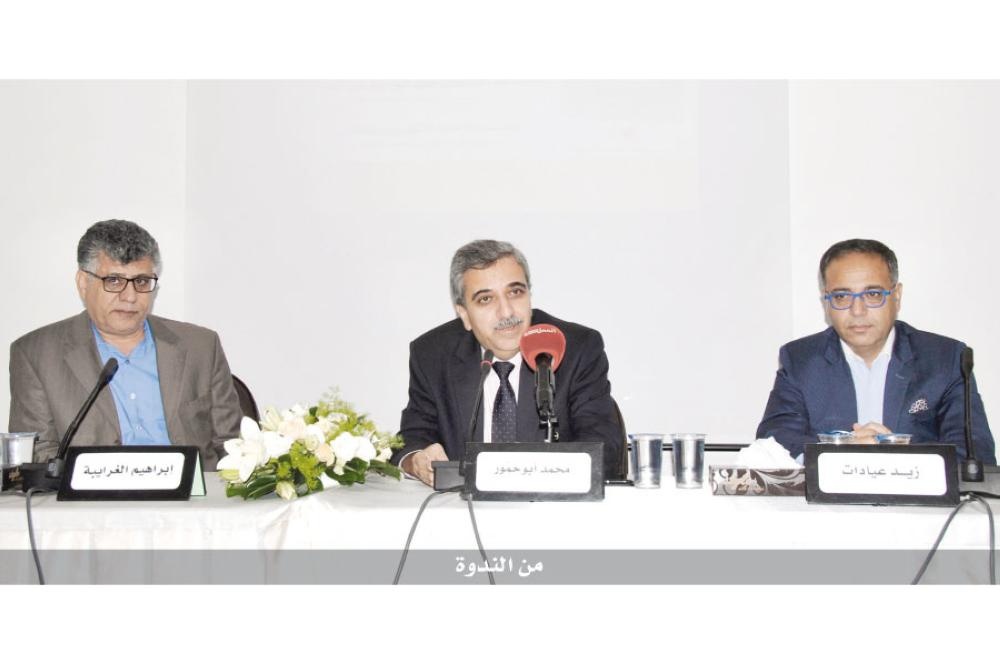Gharaibeh: Assessing the future of extremist groups and their ability to work is linked to their ability to attract funding and supporters
Gharaibeh: The protection of modernization requires a new social and cultural system, as well as diminishing of the illusion of political and social elites’ monopoly and privileges and rejection of participation, freedoms and equality
Dr. Abu Hammour: Combatting extremism has had a heavy toll on the Arab region’s means, and it continues to suffer from due socio-economic, political and environmental problems
Experts discussed on Sunday, September 30, 2018, the issue of extremism and its social, economic, political and security dimensions in the Arab region through a newly-released book, supported by ARDD, by author, researcher and journalist Ibrahim Gharaibah, entitled “Extremism”. During the session, organized by The Arab Renaissance for Democracy and Development-ARDD in collaboration with the Arab Thought Forum, ARDD Chairman of the Board of Trustees Dr. Zaid Eyadat reviewed the book, which discusses the cognitive configuration in understanding and countering extremism, while Secretary-General of the Arab Thought Forum Dr. Mohammed Abu Hammour moderated the discussion.
In his presentation, Dr. Mohammed Abu Hammour described the book as a micro-intellectual encyclopedia on extremism’s ideology, strategies and mechanics. “The horrific ramifications of extremism and terrorism are inseparable from external agendas whose interests intersect with the outcome of the conflict in the region. There are internal reasons that have accumulated over half a century in the region and have helped to implement external objectives that are now trying to re-divide and map the region,” Abu Hammour said.
He added that combatting extremism has had a heavy toll on the Arab region’s means, and it continues to suffer from social and economic problems, low growth rates and the persistence of political problems, foremost of which is the Palestinian question without a just solution that guarantees the peace, stability and legitimate rights of the Palestinian people, in addition to the lack of a common vision to face challenges and lift new generations out of frustration and despair, and slow reforms, democratization, achieving social justice and equal opportunity, and enhancing education reform.
In his introduction to the book “Extremism”, author Ibrahim Gharaibeh said: “Axiomatic questions and assessments are formed when thinking about extremism and armed groups and organizations. They simply revolve around the ability of these groups and organizations to attract volunteers, supporters and financial resources for recruitment, arming and fighting. No matter what we know or don’t know about these groups, two clear facts are sufficient to analyze and study them, namely, the ideological support of these groups, which leads some to volunteer, fight, and readily give up their lives; and the sufficient financial resources that fund their work. Assessing the future of extremist groups and their ability to work is linked to their ability to attract funding and supporters.”
“Today, we can easily observe how modern Arab countries have adapted the Western model of modernization, however, this modernization is separated from its causes and conditions. In the West, the industrial revolution and its most important aspects and manifestations were a result of the founding of new resources and markets, which in turn created new cities, social classes and elites. In the struggle between the elite and other social classes, political and cultural pluralism was formed, and democracy and the rule of law were entrenched for a peaceful organization of this competition and conflict. Thus, the new abundance of resources and knowledge has turned into a new social and cultural system,” Gharaibeh added.
He explained that the only possible way to protect this modernization was a new social and cultural system that fits cities and communities that find meaning and feasibility in their progress and freedom. The youth cannot go to schools and universities, communicate with the world and know everything, while the political and social elites continue to be eluded into being able to control and monopolies privileges and reject participation, freedoms and equality.
Gharaibeh pointed out that the interpretation of the phenomenon of extremism in its social context and then the proposal of social policies of confrontation is not a denial of the security, economic, political and religious dimensions of the problem, but because of the complexity of the issue and its effects and the multiplicity and branching of studies, the only way left is to isolate various factors and variables in its formation and focus on a few for the purpose of study and analysis; and it is in no way a realistic isolation or disregard of the multiple components and interactions that contribute to the formation of the phenomenon.
For his part, Dr. Zaid Eyadat pointed out in his review that reading the book requires great effort to follow up on its ideas, details and analysis, and that the reader must recall all that he or she knows about the subject to dialect and absorb the content. “the author included additions to enrich the subject and deepen the idea through research into the cognitive composition of extremism in the context of studying the phenomenon, such as proposals for the reasons which generate extremism and the environment which produces it. The author blends between different sciences in his research, including sociology, psychology, political science and philosophy. This diversity of methodologies was employed to study extremism as an identifier that reveals the cultural and social foundations in which this extremism originates,”Eyadat said
Dr. Eyadat said that extremism is not an “excess” in terms of the meaning of increasing the thing that applies to the desirable thing, but it is a harmful excess. He considered that one of the most important issues in studying the phenomenon of extremism is related to identity and identity crisis, as evidenced by the research included in the book discussed.


